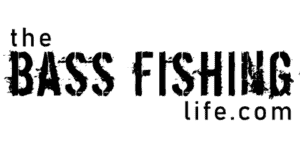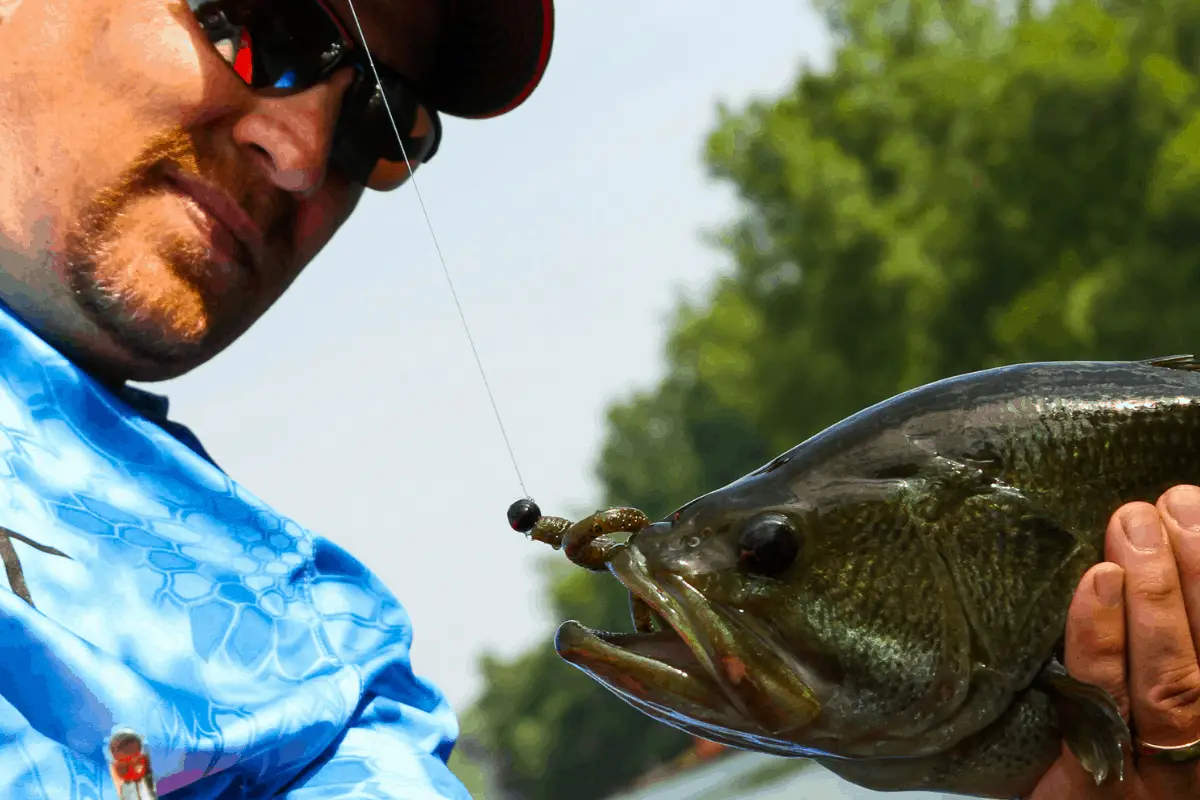The glitz and glamour of casting for cash is appealing for thousands of bass anglers. Bass enthusiasts of all ages want to test the waters of tournament bass fishing, but may not be sure how to start.
Anglers new to tournament bass fishing should start small. Fish local events or go out with a friend and have a single boat event. Testing your abilities in a variety of weather conditions will let you know which skills need practice and which skills are ready for competition.
The road to tournament angling is different for everyone, but this guide will answer most questions and give future tournament anglers a path to follow.
How to Tell If You are Ready to Fish Bass Tournaments
Every competitor has asked him or herself this question at some point – and that is natural.
This checklist has the potential to be miles long, but it really comes down to two basic questions you need to be able to answer.
- Do you have the burning passion to compete?
- Do you catch bass on more days than you don’t?
A Passion to Compete Against Other Anglers and Against Yourself
Some folks are driven by competition, others are not. This basic internal motor to constantly test yourself is a must.
The passion to compete is more applicable on an internal basis than it is against other anglers.
If you find yourself diving into new techniques, fishing different types of waters, and always trying to make yourself a better angler, you will have the drive to learn. This is how anglers compete against the best out there.
Bass fishing appears at the surface to be one angler trying to beat out a field of a hundred others. It really is one angler trying to figure things out on his or her own. If that is the focus, and if bass anglers can do that, the weigh-in stage will take care of itself.
If you are out fishing on the lake when no one else is there because the conditions are not comfortable – you have the drive.
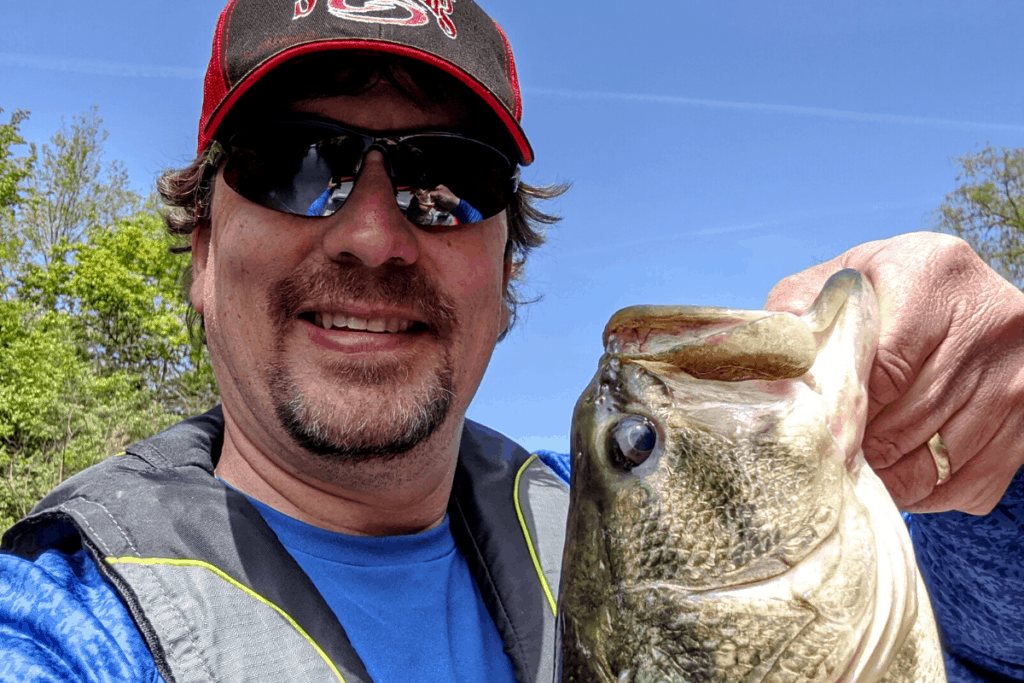
Do You Consistently Catch Bass?
There is a turning point in every bass angler’s growth process where the days of coming back to the ramp with zero fish are rare.
No matter the conditions, no matter the time of year, no matter the location – fish are being caught.
This self-test shows that adjustments can be made.
Bass fishing is a game of change. Nothing stays the same for very long. A pattern may last two days or two hours. It is how anglers adjust and adapt that make the difference. Almost every tournament winner can look back and identify one key moment that altered the outcome of the event.
Until the advent of Major League Fishing, the idea of consistently catching bass meant five fish in a day. And for most events, that still is the case.
Do you have the mindset to grind it out to the last minute looking for five good bites? We will worry about the Major League Fishing format of catch-as-many-as-you-can when more events switch to this type of format.
What Level to Start Competing At?
This is a great question and different for everyone. It hinges on several factors. And by “what level” I am referring to choosing between local club events or more regional circuits, or feeder circuits, to the big-time.
What is Your Bass Tournament Budget?
Some anglers have the time and financial resources to commit to a larger tournament circuit from the very beginning. Other anglers need to start with local club events.
The only advantage to starting with a regional circuit is the idea that you will be forced to fish new waters and meet a larger circle of anglers. Otherwise, either path is a good one.
Budgeting for bass tournaments goes way beyond the entry fee.
The additional expenses are the ones that can take a toll on the pocket book if not accounted for. Fuel, oil, tackle, tires, hotels, meals, licenses, missed time from work, etc. While this list seems daunting, it isn’t as formidable if you prepare for it.
Club events may have an entry fee of $20-$50, regional circuits are often around the $1,500 mark per event, and if you are fortunate to make it to an invitation only level, it is not uncommon to hand over $5,000 per event.
Do some research in your area. There are likely events and circuits that hit several different price points and one of them will fit within your expendable income.
Pro-Am Bass Tournaments vs Team Events
A traditional Pro-Am circuit will ask you to choose either the boater (pro) side or the non-boater (amatuer) side.
Make no mistake about it, the amatuer side has many top-level competitors who choose to not deal with bringing a boat and all the hassle that goes with it. I have learned a lot from so called, amatuers, on the back deck of my boat. In fact, some of the best anglers I have ever fished with were registered on the non-boater side.
No matter which side you choose, be open-mined and always learning.
Those who are the boater, or pro, have control of the boat and decide where the fishing will take place. The non-boater fishes from the back deck and has to adjust based on where the angler in charge wants to be.
Non-boaters may be great shallow water anglers, but the boater they are paired with might decide to fish deep, offshore structure all day. The non-boater needs to have the tackle with them to adjust to any possible scenario.
In most Pro-Am events, the boater and non-boaters are paired with different anglers each day of the tournament. All of the details on how this works will be discussed at the pre-tournament meeting, which usually takes place the evening before the first day of competition. For smaller one-day or club events, the pre-tournament meeting often happens at the ramp right before take-off.
Each angler in a Pro-Am event has their own side of the livewell and fish are kept separate.
Team events are quite different. Anglers often fish with friends and the rules change to six fish limits instead of five.
Team events allow anglers to fish all over the boat deck and the team can decide on locations, fishing techniques,and every other on-the-water decision.
Team events are a great way for anglers to start tournament fishing if they want a lower-stress splash into the competitive world.
Kayak Bass Fishing Tournaments
The competitive kayak bass fishing scene has exploded in recent years. In fact, the major tournament organizations, like B.A.S.S., have complete circuits just for kayak anglers.
This style of competitive bass fishing has opened up the sport to more folks who may not have a tricked out bass boat.
It is likely that you can find a quality kayak circuit close to where you live.
These tournaments are catch, weigh, measure, photo, and release events.
The tournament director will have specific weigh-in sheets that anglers need to use. Most of the time catches are recorded on a smart-phone app that the tournament organizers will explain to you.
Many kayak bass tournaments also allow anglers to drive to the ramp they want to take off from. In a traditional bass tournament, everyone takes off from the same launch and must drive to their location on the water.
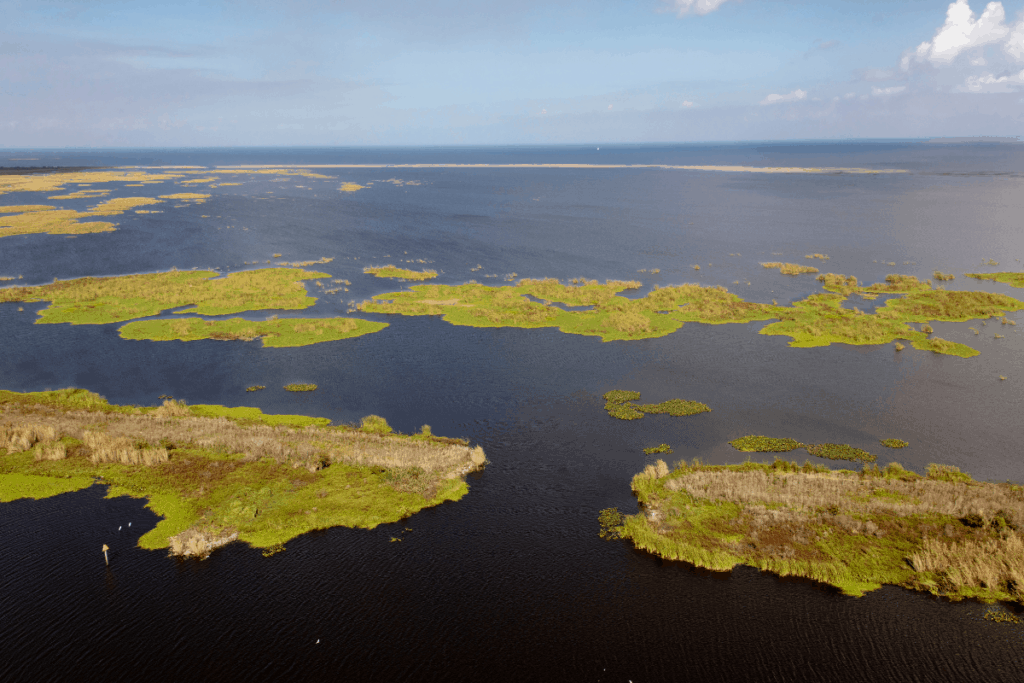
What a Typical Bass Tournament Week Looks Like
For the sake of this section, I will be referring to a normal regional event that may be either a two-or-thee day competition.
Most regional, or mid-level tournament circuits will have the opportunity for practice days. Sometimes they will be “official” days of practice with strict off-limits periods, but more often they will be anytime leading up to the event.
If a three-day event starts official competition on a Thursday, most anglers will arrive on the Sunday before and start practicing either Monday or Tuesday.
Pre-tournament meetings for this type of schedule will be Wednesday evening. Here the tournament director will go over all the rules and the pairings will take place for Pro-Am events.
What do Anglers do During Tournament Practice Days?
If you have a history on the lake or river you are competing on, then practice is about checking what you know about the water.
Where are they? How deep? What are they keyed in on? Are they on the move or staying in a general area?
When the waters you are fishing are new, then practice looks quite different. Most anglers will drive the entire lake and check everything they can. Practice days in this situation are dominated by sitting behind the console and looking at electronics.
When anglers find an area they want to check, most will smash down the barbs or fish lures without hooks. These anglers are looking for bites and other information they can garner. Tying your line directly to the o-ring on a wacky rig is a common method to search out bites.
Sticking every fish in a potential area while practicing is a sure-fire recipe for disaster on tournament day.
Practice Tournament Days are for Information
Things change constantly.
You can find a load of fish in practice and then on tournament day the wind changes direction and your spot is empty. Or you may have an awful practice and not have a clue and then your first spot on tournament morning yields a big bag.
Use your practice to learn the water and adjust. Fish to your strengths as a new tournament angler and ignore what you hear and see from other anglers that day.
Building Confidence as a Tournament Angler
I cannot even tell you how many times I felt good after practice, went to the tournament meeting and overheard all the “dock talk,” and then freaked out.
There are so many ways to catch bass. There are always fish deep. There are always fish shallow. Some anglers will come in empty while others in the same event will break the twenty pound mark. It happens.
Do what you know to do, focus, make every cast count, and don’t let the stress of the event make you fish too fast. Easy to say – but challenging for sure.
Fishing relaxed and trusting your instincts is the secret to success. Of course, the adrenaline will rush and excitement will take over, but the best anglers in the world have an uncanny ability to do their thing.
For some, that may mean ten or twelve techniques and methods they are masters at. For others, that may be three techniques.
You will learn new things and increase your tools and methods as you spend time on the water. That is how I learned to drop shot fish. My non-boater had a limit before I even had a bite. Needless to say, I learned real quick how to use this upstart finesse technique back in the early 2000s. Now I rely on it all the time.
What Happens on Tournament Morning
Launch will take place at safe light. For most organizations, this means around thirty minutes after sunrise. Weather conditions like wind, fog and storms can delay a launch or even cancel a day of competition.
Competitors start showing up at the boat ramp early, often around 4:30am. The launch line can be extensive when over one hundred boats and trucks are waiting to pull up to the ramp.
This is also the time where boaters will meet up with their non-boater partners.
It is proper etiquette, as a boater, to leave one back compartment open for the non-boater to store their equipment, lunch, and water.
The Launch
At the pre-tournament meeting, each boat is assigned a number. As boats are dropped into the water, anglers will manipulate their rigs into a rough numerical order. When the tournament director calls boat number one the rest will follow and make their way past a dock or pontoon. The administrators of the tournament will check to make sure the livewells are working, life jackets are on, and the kill-switch for the outboard is attached to the driver.
Once competitors are clear from the no-wake zone anglers are free to put the boat on plane and head to their first location.
What Tournament Day Looks Like
Depending on the size of the competitive field and the acreage of the lake, competitors may-or-may-not deal with other anglers fishing around or near their spot.
Common courtesy rules the day.
If a boat is working down a shoreline, don’t pull in front of them and cut them off.
Keep a reasonable distance and on the last day of competition it is an unwritten rule that those competitors in contention for the win are given rights to an area over a competitor that is way down the standings.
There are times when disagreements happen over fishing space, but these instances are rare.
Tournament anglers need to keep an eye on the clock. Most events have strict penalties for being late to check-in. No-fish zones are also something anglers need to adhere by. These may include things like private marinas. All of this information is discussed during the pre-tournament meeting.
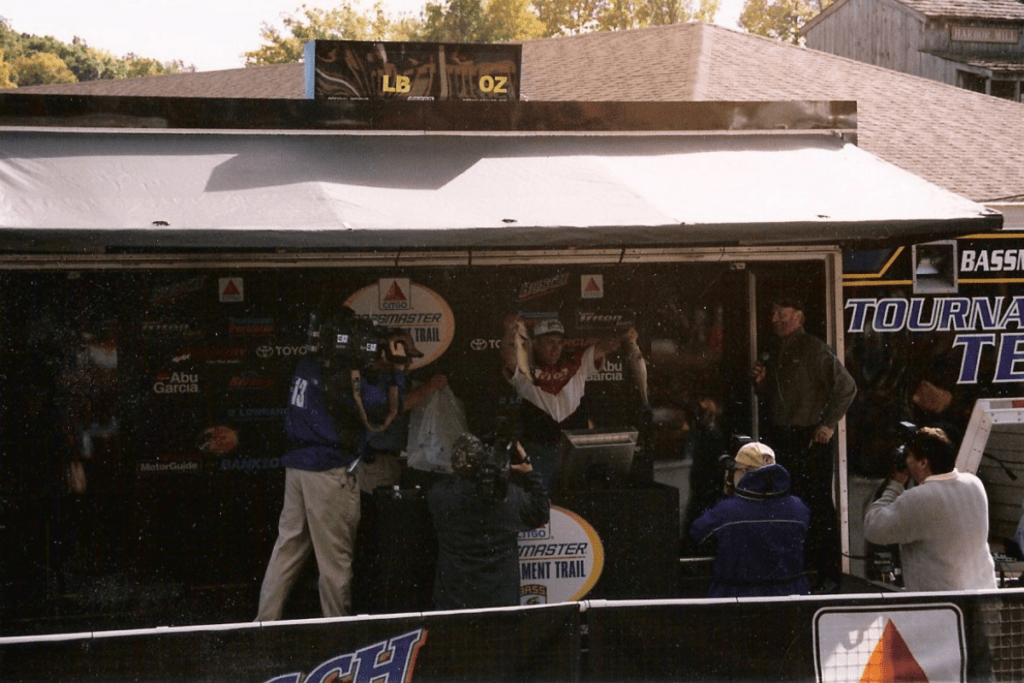
The Weigh-In Process for Bass Tournaments
In a traditional tournament format with a weigh-in, anglers will receive a weigh-in bag when they check in.
Fish are bagged and both boaters and non-boaters walk to the same weigh-in stage.
There will be a long line of tanks where anglers can hold their weigh-in bags and keep the bass in good condition.
Once the fish are weighed they are taken to a release boat and later returned to the lake.
The order for the Day 2 launch will be handed out and the process repeats itself the next day.
For most multi-day events, only the top anglers will fish the last day. In the events I fished, that meant the top 50 anglers continued on while the others packed up and headed home.
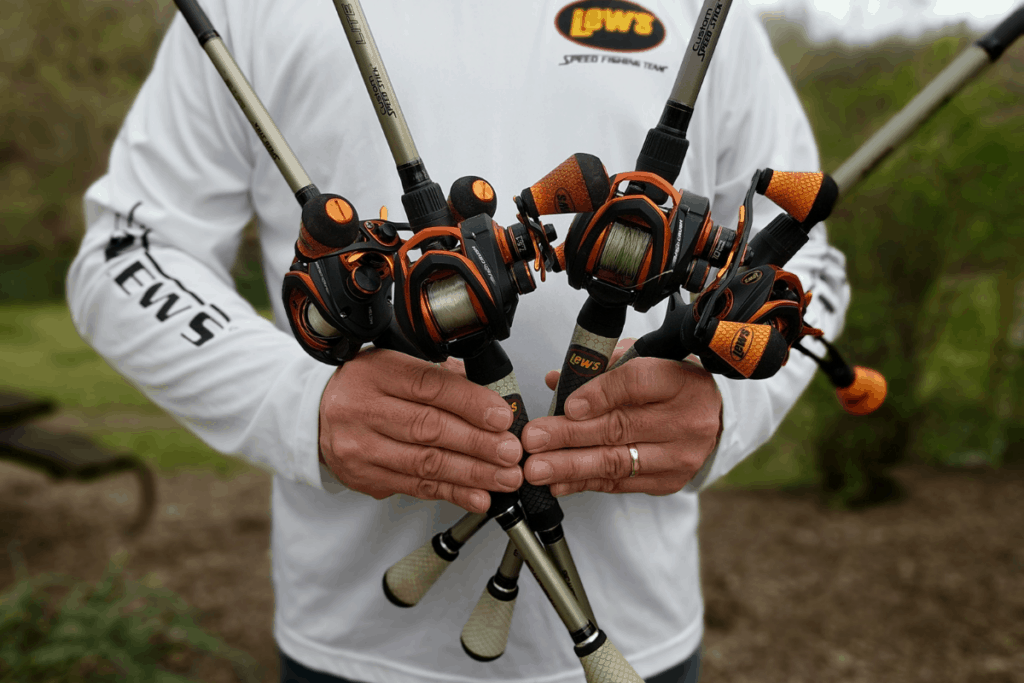
Post-Tournament Evaluation for Bass Anglers
Emotions run high after a tournament.
Anglers are either elated with their performance or disgusted. That’s OK. It’s part of the process.
Hind-sight is a tool that can be used to help prepare for the next event and become a better angler.
One of the things I learned early on was tackle preparation was much more important than I originally had thought. The amount of time lost on a competition day because of retying or digging around for that right bag of plastics can greatly reduce the number of casts made over eight hours.
Pre-tournament tackle prep can directly impact an angler’s finish.
A single hefty bass can catapult a competitor from missing the cut to making it and bringing home a check. Making twenty more casts in a day may catch that important fish. Proper tackle prep can make those twenty extra casts possible.
Proper Mental Mindset for Tournament Bass Fishing
Tournament anglers can overthink things.
I know. I’ve gone down that rabbit hole a lot.
When I was preparing for my first substantial tournament, I was fortunate to film a television show with recent Bassmaster Classic Champ and Angler-of-the-Year, Mark Davis only a week before my inauguration to the tournament world.
I asked him what he would do.
He told me to keep it simple. If it were him, fishing Grand Lake O’ the Cherokees in August, he would throw a Carolina rig and deep diving crankbait. That’s it.
He told me to fish to my strengths and enjoy it.
I did fish to my strengths – a squarebill crankbait. I ended up finishing in 38th place out of nearly 150 anglers. Mark was right.
Another great piece of advice came from perennial fan favorite, Shaw Grigsby. He was talking about the extreme cold going into a February Bassmaster Classic on the same lake.
A reporter asked him about the horrid conditions.
His response has resonated with me ever since.
To paraphrase, he explained that someone is going to win. Get over the conditions and just fish.
I had blanked in so many events because I couldn’t get over the brutal wind, relentless rain, or mind-numbing cold. Shaw’s advice is perfect.
There will be events where you are in a better place mentally than others, but the more you can relax and enjoy a day of fishing, the better you will do. Experienced anglers have the benefit of this hind-sight.
Nerves will be popping. Adrenaline will be rushing. It’s OK.
Those are all good things, but most importantly – your fishing! Have fun.
Other Items to Consider When Tournament Bass Fishing
There are some other areas I want to touch on that first time tournament anglers may not be aware of.
Insurance for Tournament Anglers
Most bass tournament organizations will require their competitors to carry a certain amount of liability insurance and also show proof of insurance during the registration process.
If an event is held on the Great Lakes, additional coverage will likely be required by the underwriter as well.
Registration for Tournaments
Local club events will be handled by the tournament director for that organization, but larger regional events will have registration deadlines and a deposit will be required.
Most of the larger feeder circuits will announce the next year’s schedule in the fall or early winter.
Anglers wanting to fish an entire series will be allowed to register first with single-event registrations opening up later. Watch the organization websites carefully. Popular circuits will fill up fast.
Tournament Rules for Bass Fishing
As mentioned earlier, the tournament director will cover all the rules prior to the official event starting, but there are some guidelines that are fairly universal.
- Fishing licenses are required for all waters fished. In other words, if you are fishing the Mississippi River you may need licenses for both Wisconsin and Minnesota.
- Some states have no-cull rules. This means once the fifth fish is put in the livewell – that is it. Careful consideration needs to be given to each fish caught after the fourth one is put in the box.
- Nets may-or-may-not be allowed. Check the organization’s rules carefully.
- If a bass dies in the livewell, it may not be discarded and a penalty will be assessed at the weigh-in. Fish care is top priority.
- During the spawning season, if bass are allowed to be targeted on the beds, most organizations require the hook to be on the inside of the mouth. Snagging or foul-hooking is not allowed and the bass must be returned to the water immediately if it is caught in such a manner.
- Some lakes and rivers have strict restrictions on fishing in-or-near marinas.
- Life jackets are required to be worn any time the outboard motor is on.
Each tournament organization has the rules posted on their websites. Read through them and be sure to ask questions if needed.
Final Thoughts
Tournament bass angling is not for everyone, but if you want to give it a try I highly encourage you to do so.
My skills as an angler progressed at an incredible rate during my first few years of competition.
Being forced to fish in a wide range of waters and conditions hones our skills and gives us ample experiences to pull from.
Remember, someone is going to win. It might as well be you.
Tight lines. Be safe out there and remember to encourage someone today. You never know how you may change their life forever.
Isaiah 6:8
